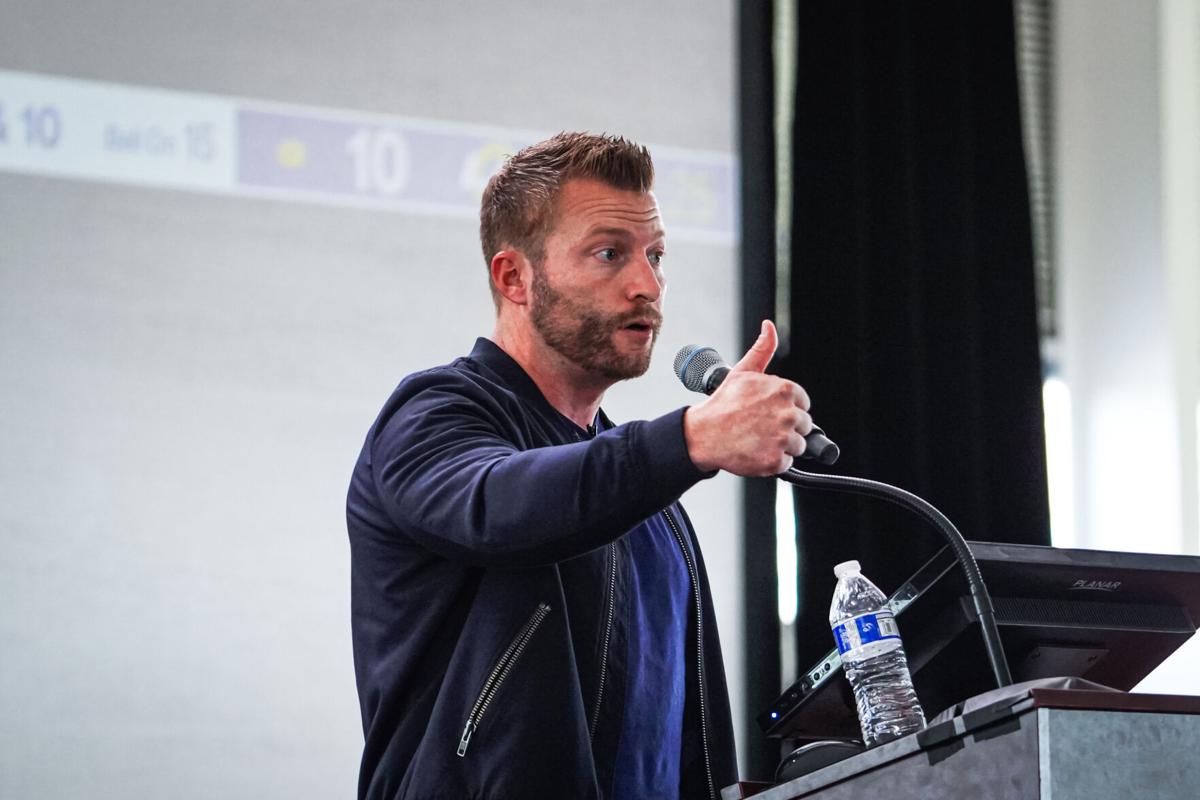Sean McVay stood at a podium with a tablet in front of him, a large screen behind him and a throng of football coaches hanging on his every word.
The Super Bowl-winning coach of the Los Angeles Rams dropped into Tucson on Friday to participate in the “Be a P.R.O.” coaching clinic organized by his friend and former colleague, Arizona coach Jedd Fisch.
McVay spent most of his 40 or so minutes on stage at the Cole and Jeannie Davis Sports Center talking ball — breaking down his offensive philosophy in rapid-fire, breathless fashion. As he telestrated one play after another, it was easy to understand why broadcast networks were interested in luring him away from the Rams. McVay easily could be a modern-day John Madden.
But McVay, 36, clearly isn’t ready to give up coaching. His enthusiasm was palpable as he discussed jet motion, B-gaps and shot plays. When he said near the end, “I could be up here all day talking about this,” you believed him.
McVay’s time was limited, though. The annual NFL owners meetings start this weekend in Palm Beach, Florida. As soon as the clock hit 1:15 p.m., McVay headed out the door.
But his appearance at the clinic, however brief, lent considerable insight into what Fisch is trying to accomplish at Arizona. Fisch has served under several of the NFL’s most influential coaches, but McVay — whom Fisch worked for in 2018 and ‘19 — clearly had a significant impact on him.
Fisch’s organizational philosophy is similar to McVay’s, if not a carbon copy. Fisch’s offense features many of the same concepts.
“When we talk about the mindset of being purposeful, resilient and original” — which is what P.R.O. stands for — “it all comes from so many of the values that I learned during my time with Sean,” Fisch said as he introduced McVay.
“He’s the standard in the type of person he is. He’s the standard in the type of coach he is.”
McVay thanked Fisch for the kind words. Then McVay reciprocated.
“I’m here for one reason, and that’s because of Jedd Fisch,” he said. “Relationships are everything in this business, and the relationship that we were able to develop ... (I’m) just really grateful for that.
“Jedd’s gonna do a great job. He’s done a great job.
“I loved ... watching the way that this program competed. They just got better as the year progressed. As you could see, there was a belief. There’s real power in that belief. There’s a foundation that’s being built the right way, and that’s the thing that gives you the chance to sustain over time.”
Arizona went 1-11 in Fisch’s first season. The Wildcats entered the campaign with a 12-game losing streak that stretched to 20 before the UA defeated Cal on Nov. 6.
Arizona never stopped playing hard in Year 1 under Fisch, and the Wildcats were competitive well into the second half in most of the games they played.
“You talk about all the skills and the traits that you want from a leader, Jedd has that,” McVay said. “What is a leader? There’s a lot of different topics and different things that you can talk about. But for us as coaches, in its simplest form, a great leader really does two things: He makes every person he’s around better and every situation he’s a part of better. ... That’s exactly what Jedd does.
“I’m really excited to see what this program does and how they’re going to continue to take off under his guidance and leadership.”
After about three minutes, McVay offered a segue into what he really came to Tucson to do:
“Guys are looking at me like, ‘All right, let’s talk some freaking football now.’”
McVay then launched into a monologue that was all about ball. The main points included:
Everything starts with the players, with an emphasis on what they’re capable of doing (as opposed to what they aren’t). The quarterback sits atop that hierarchy.
Having an identity and a core belief.
Marrying the run and pass. McVay and Fisch both worked for Mike Shanahan, who mastered that concept and passed it on to his pupils.
Running plays that start out looking the same but end up being different.
Attacking fronts and making defensive players “defend every single blade of grass.”
Finding ways to take stress off what McVay considers the two most difficult positions to play — quarterback and offensive line.
Making sure all players — not just the stars — know that the coaches believe in them.
“Players want to be believed in,” McVay said. “It is a powerful thing.
“Never take for granted as a coach the positive effect and influence that you can have by believing in a guy — being willing, when he makes a mistake, to (give him) the freedom to fail, put your arm around him.”
McVay spoke for a few more minutes before exiting to a round of applause. His final words: “I can’t wait to watch the Wildcats roll this year.”





